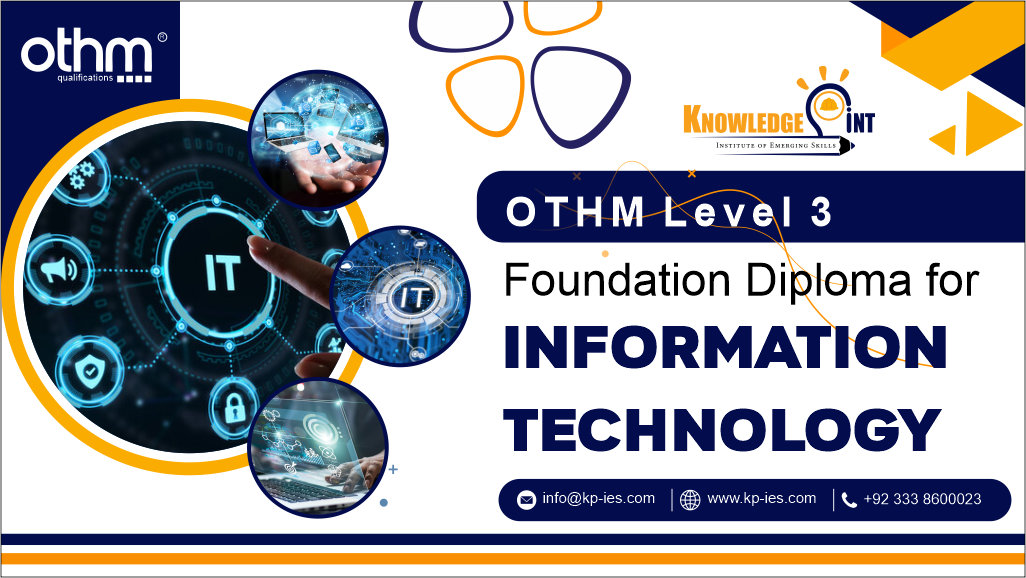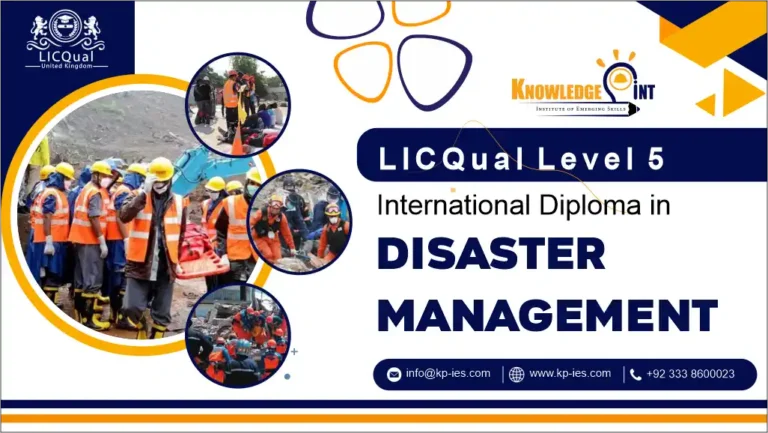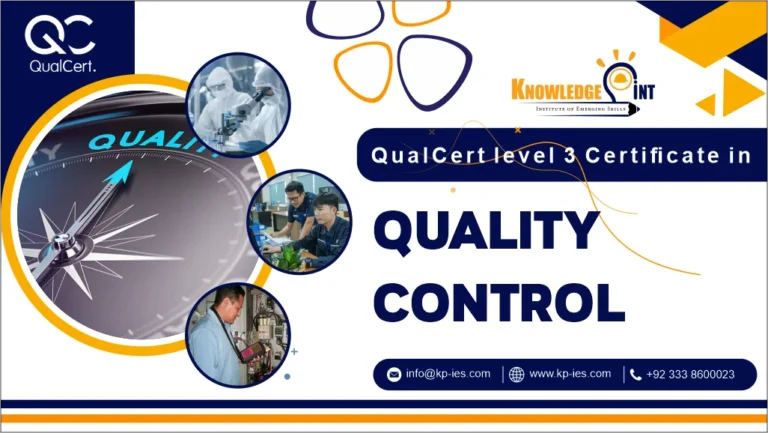In today’s digital age, proficiency in information technology (IT) is not just advantageous but essential. The OTHM Level 3 Foundation Diploma in Information Technology is designed to equip learners with fundamental IT skills and knowledge, preparing them for a wide range of careers in the dynamic and evolving field of technology. Whether you’re passionate about software development, cybersecurity, or network administration, this diploma lays a solid foundation for your journey into the world of IT.
The OTHM Level 3 Foundation Diploma in Information Technology is a comprehensive qualification that introduces learners to essential IT concepts and practices. It covers key areas of IT, providing both theoretical understanding and practical skills necessary for entry-level IT roles or further study in specialized IT disciplines.
The OTHM Level 3 Foundation Diploma in Information Technology is your gateway to a rewarding career in the dynamic and ever-evolving field of IT. Whether you aspire to become a software developer, cybersecurity expert, or network administrator, this diploma provides the essential knowledge and skills to succeed. By investing in your education and acquiring practical IT expertise, you can open doors to diverse career opportunities and make a meaningful impact in the world of technology. Take the first step towards your future in IT with the OTHM Level 3 Foundation Diploma in Information Technology and embark on a journey of continuous learning and professional growth.
Course Overview
The OTHM Level 3 Foundation Diploma in Information Technology consists of 6 mandatory units which are as follows.
The OTHM Level 3 Foundation Diploma in Information Technology is designed to equip students with the essential skills and knowledge required for successful academic progression. Here are the key learning outcomes for each module:
Computer Systems
- Understanding Hardware Components: Gain knowledge of computer hardware components, including CPUs, memory, storage devices, and input/output devices.
- Operating Systems: Understand the functions and features of operating systems, including installation, configuration, and management of operating system software.
- System Architecture: Learn about computer system architecture, including CPU architecture, memory management, and system buses.
- Computer Performance: Evaluate computer system performance metrics and techniques for optimizing system performance.
- Troubleshooting: Develop skills in diagnosing and troubleshooting hardware and software issues in computer systems.
Coding and Website Development
- Programming Fundamentals: Learn programming concepts and principles, including variables, data types, control structures, and functions.
- Web Technologies: Acquire skills in HTML, CSS, and JavaScript for creating and styling web pages.
- Website Design: Understand principles of user interface (UI) and user experience (UX) design for developing intuitive and user-friendly websites.
- Content Management Systems (CMS): Gain proficiency in using CMS platforms like WordPress or Joomla for website creation and management.
- Responsive Design: Implement responsive web design techniques to ensure websites display correctly on various devices and screen sizes.
Networks
- Network Fundamentals: Understand networking concepts such as protocols, IP addressing, subnetting, and routing.
- Network Devices: Learn about network devices including routers, switches, firewalls, and access points, and their roles in network infrastructure.
- Network Security: Gain knowledge of network security principles, including authentication, encryption, firewalls, and intrusion detection/prevention systems (IDS/IPS).
- Network Administration: Develop skills in configuring and managing network devices and services to ensure reliable network operations.
- Troubleshooting Networks: Learn troubleshooting methodologies and tools to diagnose and resolve network connectivity and performance issues.
Mobile Communications
- Mobile Technologies: Understand mobile communication technologies, including cellular networks (3G, 4G, 5G), Wi-Fi, Bluetooth, and Near Field Communication (NFC).
- Mobile Application Development: Acquire skills in developing mobile applications for iOS, Android, or cross-platform environments using frameworks like React Native or Flutter.
- Mobile Security: Learn about mobile security threats and best practices for securing mobile devices, apps, and data.
- Mobile Device Management (MDM): Understand MDM solutions and techniques for managing and securing mobile devices deployed in enterprise environments.
Cyber Security
- Cyber Threats: Identify and analyze common cyber threats, including malware, phishing attacks, denial-of-service (DoS) attacks, and social engineering.
- Security Principles: Understand security principles and practices, including confidentiality, integrity, availability (CIA), and defense-in-depth.
- Risk Management: Learn risk assessment methodologies and strategies for mitigating cybersecurity risks within organizations.
- Incident Response: Develop skills in incident detection, response, and recovery to minimize the impact of security incidents.
- Security Tools: Gain proficiency in using security tools such as antivirus software, intrusion detection systems (IDS), and vulnerability scanners.
Social Media for Business
- Social Media Platforms: Understand popular social media platforms, their features, and best practices for business use.
- Content Creation and Marketing: Develop skills in creating engaging content for social media marketing campaigns, including text, images, and videos.
- Audience Engagement: Learn strategies to build and engage audiences on social media, including community management and customer support.
- Analytics and Insights: Use social media analytics tools to measure campaign performance, track audience behavior, and optimize marketing strategies.
- Social Media Policies: Understand legal and ethical considerations related to social media use in business, including privacy issues and compliance with regulations.
These learning outcomes equip learners with essential knowledge and skills in computer systems, coding and website development, networks, mobile communications, cyber security, and social media for business, preparing them for diverse career opportunities in the dynamic field of information technology.
Course Benefits of the OTHM Level 3 Foundation Diploma in Information Technology :
1. Specialized Expertise
- Auditing Proficiency: Gain specialized knowledge and skills in auditing energy management systems according to the ISO 50001:2018 standard.
- Industry Recognition: Earn a globally recognized qualification that demonstrates your proficiency as an energy management systems auditor.
2. Career Advancement
- Expanded Career Opportunities: Qualify for roles such as Lead Energy Auditor, Energy Management Consultant, or Compliance Officer.
- Higher Earning Potential: Enhance your value to employers and increase your earning potential with specialized expertise in energy management auditing.
3. Industry-Relevant Skills
- Practical Application: Acquire practical skills and techniques for planning, conducting, and documenting energy management system audits.
- Effective Communication: Develop communication skills to interact with auditees, audit teams, and stakeholders effectively.
4. Contribution to Sustainability
- Promotion of Energy Efficiency: Play a key role in promoting energy efficiency and reducing environmental impact within organizations.
- Support for Sustainable Practices: Assist organizations in implementing and maintaining energy management systems that support sustainability goals.
5. Quality Assurance
- Compliance Assurance: Help organizations achieve compliance with ISO 50001:2018 requirements and other relevant regulatory standards.
- Risk Mitigation: Identify areas of non-conformance and provide recommendations for corrective actions to mitigate risks.
6. Continuous Professional Development
- Lifelong Learning: Engage in continuous professional development by staying updated with the latest developments and trends in energy management auditing.
- Networking Opportunities: Connect with industry professionals, auditors, and experts, expanding your professional network and opportunities.
7. Organizational Benefits
- Improved Performance: Contribute to the improvement of organizational energy performance through effective auditing and recommendations for continuous improvement.
- Enhanced Reputation: Help organizations build a positive reputation for their commitment to energy management and sustainability practices.
8. Personal Growth
- Leadership Development: Develop leadership skills to effectively manage audit teams, delegate tasks, and ensure audit objectives are met.
- Confidence Boost: Gain confidence in your abilities as an energy management systems auditor through practical training and hands-on experience.
The OTHM Level 3 Foundation Diploma in Information Technology serves as a stepping stone for learners aiming to advance their careers and pursue higher-level qualifications in various specialized areas of IT. Upon completion of this diploma, individuals have several pathways for further education, professional development, and career advancement in the rapidly evolving field of information technology.
1. Higher-Level Qualifications
Level 4 and Level 5 Diplomas in IT:
- OTHM Level 4 Diploma in Computing: Progress to a more advanced diploma focusing on specialized areas such as software development, cybersecurity, data science, or IT management.
- OTHM Level 5 Diploma in Information Technology: Build on foundational knowledge with in-depth study of advanced topics such as cloud computing, artificial intelligence, network security, or digital forensics.
2. Professional Certifications
IT Certifications:
- CompTIA Certifications (A+, Network+, Security+): Entry-level certifications covering essential IT skills in hardware, networking, and cybersecurity.
- Cisco Certified Network Associate (CCNA): Certification in networking fundamentals, routing and switching, and network security.
- Certified Information Systems Security Professional (CISSP): Globally recognized certification in cybersecurity management and strategy.
- Microsoft Certified Solutions Associate (MCSA): Certifications in Microsoft technologies such as Windows Server, SQL Server, and Azure cloud services.
3. Undergraduate Degrees
Bachelor’s Degrees in IT or Computer Science:
- Pursue a Bachelor’s degree to deepen knowledge in specialized areas such as software engineering, data analytics, artificial intelligence, or digital marketing.
- Bachelor of Science in Cybersecurity: Focus on cybersecurity principles, risk management, ethical hacking, and digital forensics.
- Bachelor of Science in Software Engineering: Learn advanced programming languages, software development methodologies, and project management skills.
4. Career Opportunities
Entry-Level IT Roles:
- IT Support Specialist: Provide technical assistance and troubleshooting support to users and organizations, ensuring smooth operation of IT systems.
- Junior Software Developer: Assist in designing, coding, and testing software applications or mobile apps, collaborating with senior developers and stakeholders.
- Network Administrator: Manage and maintain computer networks, ensuring connectivity, security, and optimal performance.
Specialized IT Roles:
- Cybersecurity Analyst: Monitor and respond to security incidents, implement security measures, and conduct vulnerability assessments and penetration testing.
- Web Developer: Design and develop responsive websites, integrating user interface (UI) and user experience (UX) design principles.
- Database Administrator: Manage databases, ensuring data security, availability, and integrity, and optimizing database performance.
5. Continuous Learning and Professional Development
Master’s Degrees and MBA:
- Pursue a Master’s degree in IT management, cybersecurity, data science, or digital innovation to advance to senior and leadership roles in IT.
- Master of Business Administration (MBA) with IT Specialization: Combine business management skills with advanced IT knowledge to lead technology-driven initiatives and projects.
Professional Development and Certifications:
- Stay updated with the latest industry trends, technologies, and best practices through professional development courses, workshops, and conferences.
- Obtain specialized certifications in emerging technologies such as blockchain, artificial intelligence, cloud computing, or internet of things (IoT).
The OTHM Level 3 Foundation Diploma in Information Technology lays a solid foundation for learners to embark on a successful career journey in the dynamic and rapidly evolving field of IT. By acquiring essential knowledge and skills in computer systems, coding and website development, networks, mobile communications, cybersecurity, and social media for business, graduates of this diploma are well-prepared for diverse career opportunities and challenges in the digital age. Invest in your future today with the OTHM Level 3 Foundation Diploma in Information Technology and unlock a world of possibilities in the exciting realm of IT innovation and technology advancement.







